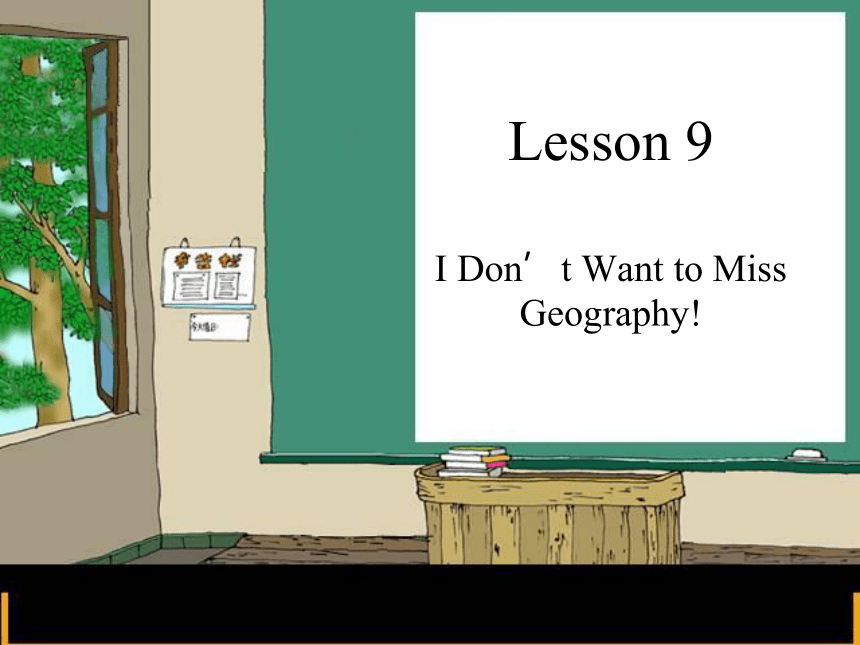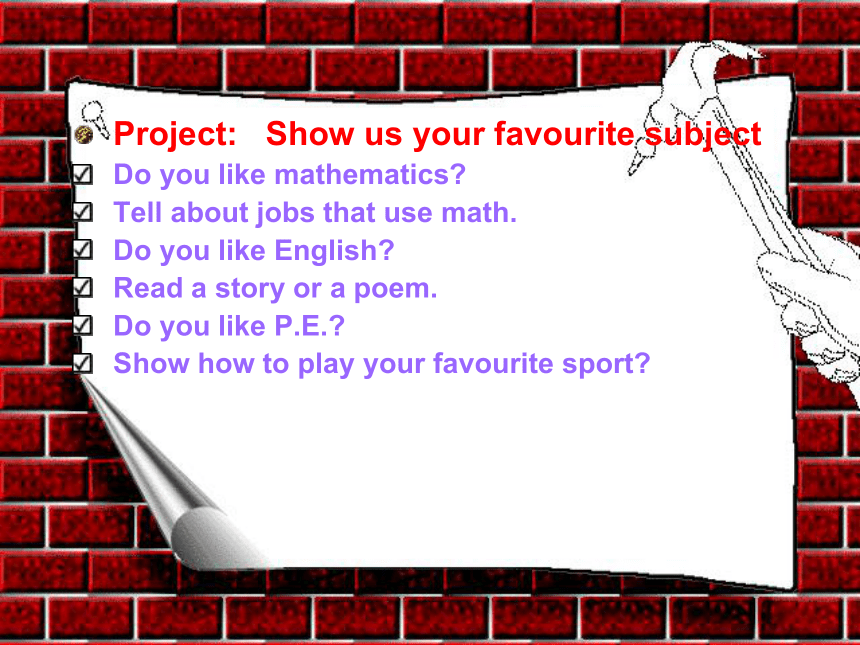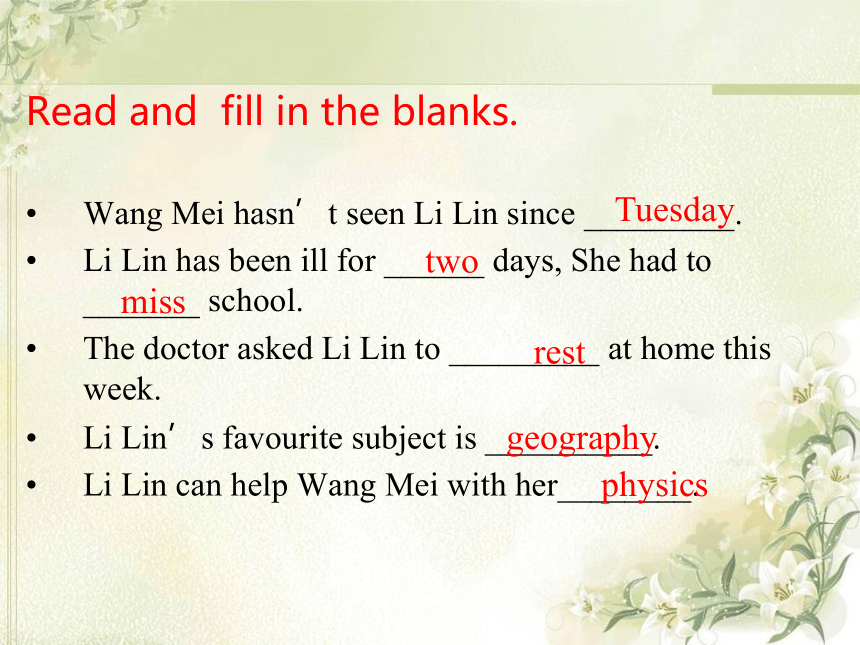冀教版英语八年级上册Unit 2 Lesson 9 I Don't Want to Miss Geography !同步新授课件 (共13张PPT)
文档属性
| 名称 | 冀教版英语八年级上册Unit 2 Lesson 9 I Don't Want to Miss Geography !同步新授课件 (共13张PPT) |  | |
| 格式 | ppt | ||
| 文件大小 | 816.0KB | ||
| 资源类型 | 教案 | ||
| 版本资源 | 冀教版 | ||
| 科目 | 英语 | ||
| 更新时间 | 2022-06-02 10:38:33 | ||
图片预览






文档简介
(共13张PPT)
Lesson 9
I Don’t Want to Miss Geography!
math
biology
science
physics
history
Chinese
music
art
P.E.
geography
social studies
Project: Show us your favourite subject
Do you like mathematics
Tell about jobs that use math.
Do you like English
Read a story or a poem.
Do you like P.E.
Show how to play your favourite sport
Find some classmates who like the same subject. Together, show the class why it’s your favorite subject. Here are some things you can do:
Do you like mathematics Tell about jobs that use math.
Do you like English Read a story or poem (诗) .
Do you like P.E. Show how to play your favorite sport.
Do you like art Show some of the things you have made in your art class.
Read and fill in the blanks.
Wang Mei hasn’t seen Li Lin since _________.
Li Lin has been ill for ______ days, She had to _______ school.
The doctor asked Li Lin to _________ at home this week.
Li Lin’s favourite subject is __________.
Li Lin can help Wang Mei with her________.
Tuesday
rest
miss
two
geography
physics
Read and answer
1. How is Li Lin today
2. What does Wang Mei think of physics
3. When will Li Lin and Wang Mei do their homework together
She is fine today. But she still has cough.
Physics is a headache for her.
Every Thursday after school from 7:00 to 8:30.
Language points
1.I haven’t seen you since Tuesday , Li Lin.
since 介词,意为“自......以后;从......以来”,后接表示时间点的单词或短语,时态常用现在完成时,且在肯定句中谓语动词要用延续性动词。
eg.She has been in Shanghai since ten tears ago. 她来上海十年了 。
【拓展】(1)since 还可用作连词,意为“自从......以来”,
其后跟一般过去时的句子,多用于现在完成时。
He has taught in this school since he was twenty years old.
自从他20岁以来,他就在这所学校教书。
(2)since 用作连词,意为“既然;由于”,引导
原因状语从句,常放在句首。
Since you are busy, you needn’t come tomorrow.
既然你忙,明天你就不必来了。
2. What’s the matter 你怎么啦?
matter 名词,意为“毛病;麻烦事”,常用于“What’s the matter with... ”中,with后面可接人也可接物。
What's wrong with...
What's the trouble with...
What's up
3. sick adj.生病的
ill 和sick都有"生病的?有病的"之意?但用法并不完全相同。
ill 表示"生病的,有病的"这一意思时,一般用作表语,不能作定语。而sick 既可以作表语又可以作定语。如"病人"可以说a sick man 或the sick, 但不能说an ill man 或the ill。又如:She is ill / sick in bed. 她卧病在床。
She is looking after her sick father. 她在照顾她生病的父亲。
sick 有"恶心的,厌倦的"之意。ill 作定语修饰名词时是"坏的,邪恶的"之意。
The smell makes me sick.这气味使我感到恶心。
He is an ill man. 他是一个邪恶的人。
4. for two days 表示一个时间段,指动作持续了两天,强调“延续”。
“for+一段时间” 是现在完成时态的标志词。
“since +过去时间/一般过去时的句子” 是现在完成时态的标志词。
5. Good for you ! 太好了!
有时可以用来说反语,即对方很差劲做了傻事,你可以讽刺他“good for you
6.have a cough
意为 “咳嗽”,have a/an +疾病名词, 意为“得了......病”。
I had a cough last night. 昨天晚上我咳嗽了。
【拓展】have 的常用短语:
have a cold感冒,have a bad cold患重感冒,have a fever发烧, have a headache头痛, have a toothache牙痛, have a stomachache肚子痛;胃痛
7.not …at all 根本不,一点也不.用来修饰谓语动词时,not常与连系动词be、助动词或情态动词一起使用,at all 放在句末。
I’m not interested in music at all. 我对音乐一点不感兴趣。
【用法】
(1)表示否定,意为“根本不,一点也不”,常作答Would you mind... 句型。
— Would you mind opening the door 你介意打开门吗?
— No, not at all. 不,一点也不。
(2)回答感谢用语。
Not at all. = That‘s all right. = You’re welcome.
= That‘s a pleasure. 没关系
8. It's a date.就这么说定了
Good idea! It's a date.好主意,就这么办。
9. be convenient for 对某人来说是方便的
convenient 形容词,意为“方便的;便利的”,名词是convenience(方便),反义词是inconvenient(不方便的)。
Can you meet at 9 tomorrow morning if it is convenient for you
如果您方便的话,明早9点会和好么?
Write a report to show your favourite subject.
Homework
Lesson 9
I Don’t Want to Miss Geography!
math
biology
science
physics
history
Chinese
music
art
P.E.
geography
social studies
Project: Show us your favourite subject
Do you like mathematics
Tell about jobs that use math.
Do you like English
Read a story or a poem.
Do you like P.E.
Show how to play your favourite sport
Find some classmates who like the same subject. Together, show the class why it’s your favorite subject. Here are some things you can do:
Do you like mathematics Tell about jobs that use math.
Do you like English Read a story or poem (诗) .
Do you like P.E. Show how to play your favorite sport.
Do you like art Show some of the things you have made in your art class.
Read and fill in the blanks.
Wang Mei hasn’t seen Li Lin since _________.
Li Lin has been ill for ______ days, She had to _______ school.
The doctor asked Li Lin to _________ at home this week.
Li Lin’s favourite subject is __________.
Li Lin can help Wang Mei with her________.
Tuesday
rest
miss
two
geography
physics
Read and answer
1. How is Li Lin today
2. What does Wang Mei think of physics
3. When will Li Lin and Wang Mei do their homework together
She is fine today. But she still has cough.
Physics is a headache for her.
Every Thursday after school from 7:00 to 8:30.
Language points
1.I haven’t seen you since Tuesday , Li Lin.
since 介词,意为“自......以后;从......以来”,后接表示时间点的单词或短语,时态常用现在完成时,且在肯定句中谓语动词要用延续性动词。
eg.She has been in Shanghai since ten tears ago. 她来上海十年了 。
【拓展】(1)since 还可用作连词,意为“自从......以来”,
其后跟一般过去时的句子,多用于现在完成时。
He has taught in this school since he was twenty years old.
自从他20岁以来,他就在这所学校教书。
(2)since 用作连词,意为“既然;由于”,引导
原因状语从句,常放在句首。
Since you are busy, you needn’t come tomorrow.
既然你忙,明天你就不必来了。
2. What’s the matter 你怎么啦?
matter 名词,意为“毛病;麻烦事”,常用于“What’s the matter with... ”中,with后面可接人也可接物。
What's wrong with...
What's the trouble with...
What's up
3. sick adj.生病的
ill 和sick都有"生病的?有病的"之意?但用法并不完全相同。
ill 表示"生病的,有病的"这一意思时,一般用作表语,不能作定语。而sick 既可以作表语又可以作定语。如"病人"可以说a sick man 或the sick, 但不能说an ill man 或the ill。又如:She is ill / sick in bed. 她卧病在床。
She is looking after her sick father. 她在照顾她生病的父亲。
sick 有"恶心的,厌倦的"之意。ill 作定语修饰名词时是"坏的,邪恶的"之意。
The smell makes me sick.这气味使我感到恶心。
He is an ill man. 他是一个邪恶的人。
4. for two days 表示一个时间段,指动作持续了两天,强调“延续”。
“for+一段时间” 是现在完成时态的标志词。
“since +过去时间/一般过去时的句子” 是现在完成时态的标志词。
5. Good for you ! 太好了!
有时可以用来说反语,即对方很差劲做了傻事,你可以讽刺他“good for you
6.have a cough
意为 “咳嗽”,have a/an +疾病名词, 意为“得了......病”。
I had a cough last night. 昨天晚上我咳嗽了。
【拓展】have 的常用短语:
have a cold感冒,have a bad cold患重感冒,have a fever发烧, have a headache头痛, have a toothache牙痛, have a stomachache肚子痛;胃痛
7.not …at all 根本不,一点也不.用来修饰谓语动词时,not常与连系动词be、助动词或情态动词一起使用,at all 放在句末。
I’m not interested in music at all. 我对音乐一点不感兴趣。
【用法】
(1)表示否定,意为“根本不,一点也不”,常作答Would you mind... 句型。
— Would you mind opening the door 你介意打开门吗?
— No, not at all. 不,一点也不。
(2)回答感谢用语。
Not at all. = That‘s all right. = You’re welcome.
= That‘s a pleasure. 没关系
8. It's a date.就这么说定了
Good idea! It's a date.好主意,就这么办。
9. be convenient for 对某人来说是方便的
convenient 形容词,意为“方便的;便利的”,名词是convenience(方便),反义词是inconvenient(不方便的)。
Can you meet at 9 tomorrow morning if it is convenient for you
如果您方便的话,明早9点会和好么?
Write a report to show your favourite subject.
Homework
同课章节目录
- Unit 1 Me and My Class
- Lesson 1 Back to School!
- Lesson 2 Many Faces, One Picture
- Lesson 3 Getting to Know You!
- Lesson 4 Best Friends
- Lesson 5 Meet Ms. Liu
- Lesson 6 Jenny's Week
- Unit 2 My Favourite School Subject
- Lesson 7 Don't Be Late for Class!
- Lesson 8 E-mail Helpers!
- Lesson 9 I Don't Want to Miss Geography !
- Lesson 10 Looking for Lisa
- Lesson 11 Lily Learns about China !
- Lesson 12 Karen's Hair Stood Up!
- Unit Review
- Unit 3 Families Celebrate Togethe
- Lesson 13 I Love Autumn
- Lesson 14 Happy Memories
- Lesson 15 A Present for Li Ming!
- Lesson 16 Happy Thanksgiving!
- Lesson 17 Presents from Canada!
- Lesson 18 Li Ming's Birthday
- Unit Review
- Unit 4 My Neighbourhood
- Lesson 19 The Best Neighourhood
- Lesson 20 No Stopping!
- Lesson 21 Eat a Donut and Turn Right
- Lesson 22 I Like My Neighbourhood
- Lesson 23 People in My Neighbourhood
- Lesson 24 I Need a Map!
- Unit Review
- Unit 5 My Future
- Lesson 25 I Want to Be a Teacher!
- Lesson 26 What Will I Be ?
- Lesson 27 What's Your Advice?
- Lesson 28 Rich or Poor? It Doesn't Matter!
- Lesson 29 Our Ambitions and Dreams
- Lesson 30 A Famous Friend?
- Unit Review
- Unit 6 Go With Transportation !
- Lesson 31 How Do You Travel ?
- Lesson 32 Trains Go Faster !
- Lesson 33 Life on Wheels
- Lesson 34 Flying Donuts
- Lesson 35 Future Transportation
- Lesson 36 Clean Cars ?
- Unit Review
- Unit 7 Enjoy Your Hobby
- Lesson 37 What's Your Hobby ?
- Lesson 38 Hobbies Are Fun!
- Lesson 39 Danny's Hobby
- Lesson 40 What's Paul's Hobby?
- Lesson 41 Show and Tell!
- Lesson 42 The New Club
- Unit Review
- Unit 8 Celebrating Me
- Lesson 43 What Makes You Unique?
- Lesson 44 Georgia Plays Basketball
- Lesson 45 Be Yourself !
- Lesson 46 My Dream
- Lesson 47 I Made It !
- Lesson 48 Li Ming's Report
- Unit Review
